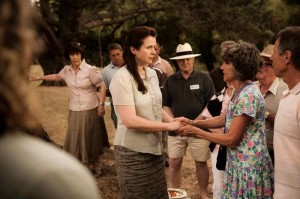Loach’s latest portrays sobering drama
Despite the positive images the title might evoke, Oranges and Sunshine is a sobering drama investigating the true story of Margaret Humphreys (Emily Watson) and the child migrant scheme that occurred between England and Australia in the ’50s and ’60s. The film, directed by Jim Loach, is set in 1986 and revolves around Margaret, who gains public acclaim by bringing former child migrants to peace with their rough pasts.

Dramatic heroine · Emily Watson plays the role of Margaret Humphreys, the investigative protagonist who reunites families fallen victim to the child migrant movement in England and Australia in the ’50s and ’60s. - Photo courtesy of Icon Movies
As Margaret comes into contact with people who had been separated from their families and homes and sent to Australia in their youth, she becomes more determined to uncover the cause of these forced child migrations. Margaret comes to discover that, during the ’50s and ’60s, thousands of impoverished, orphaned children in England were put on boats, sent to Australia and used for free labor, specifically at a Christian school called Bindoon. The more time Margaret spends in Australia, the bigger a toll it takes on her family life and her public perception.
Such is the not-so-sunny story of Oranges and Sunshine.
Though the film operates on an intriguing and refreshing premise, the script has major flaws. The pacing feels imbalanced: The first half hour of the film flies by, but the remainder of the film doesn’t accomplish much.
And once Margaret begins traveling to Australia and gaining publicity, the storyline repeats itself with different people — she meets former child migrants, hears their stories and tries to track down their long-lost parents to bring them peace.
A rather promiscuous but important secret about Bindoon is revealed late in the film and is not properly dealt with in the end. The ending also seems forged and awkwardly inconclusive — as if screenwriter Rona Munro is starting to tell us a juicy secret, but then stops mid-sentence.
However, the script does have some redeeming qualities. The premise is strong, and the characters, such as the zany Len (David Wenham) and the heavy-hearted Jack (Hugo Weaving) are three-dimensional, heartwarming and sometimes even tear-inspiring.
Wenham gives a standout portrayal of Len, an ex-child migrant who has searched for years to find his mother — and later challenges Margaret to find his mother for him.
The character begins as somewhat of an obnoxious jerk and could have easily been presented as unlikable. But in the hands of Wenham, Len’s outlandish behavior is understandable, making him even more likable when he finally begins to soften.
Weaving also delivers an excellent performance as Jack, the estranged brother of one of Margaret’s patients. Weaving gives a raw, touching and, at times, hard-to-swallow performance.
And of course, lest we forget Watson: She is undoubtedly a strong actress whose determination and feistiness drive the bulk of the movie. Her character, however, errs on the side of irksome as the film progresses, mostly because she becomes unstable and cries in nearly every scene in the latter half of the movie. But to be fair, Watson’s melodrama has more to do with the script problems than her ability to act.
Perhaps the heart of the film’s problems lies in the fact that it was advertised as an uplifting, inspirational tale, yet in reality it is far more raw. Audiences, because of the trailers and advertisements, are probably more prepared to see Erin Brockovich.
Unlike the glossy, uplifting machine of mainstream American cinema, Oranges and Sunshine stays true to the raw essence of the child migrant scheme; whether for better or worse is for the viewer to decide. It’s not a glamorized, romantic version of the child migrant scheme — in that way it is distinctly un-American.
In the end, Oranges and Sunshine has noticeable flaws, but still delivers strong performances and raw, thought-provoking sequences.
